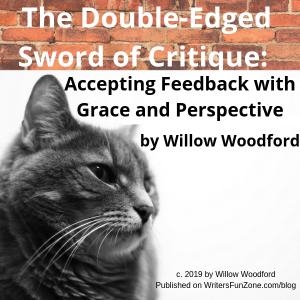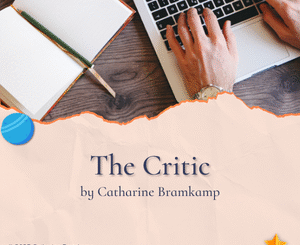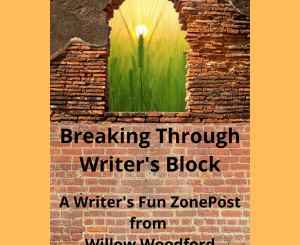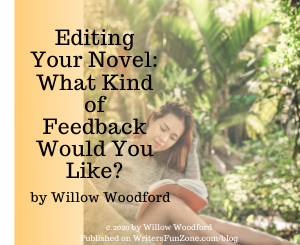The Double-Edged Sword of Critique: Accepting Feedback with Grace and Perspective by Willow Woodford
 Let’s welcome back monthly columnist Willow Woodford as she shares with us: “The Double-Edged Sword of Critique: Accepting Feedback with Grace and Perspective.” Enjoy!
Let’s welcome back monthly columnist Willow Woodford as she shares with us: “The Double-Edged Sword of Critique: Accepting Feedback with Grace and Perspective.” Enjoy!
***
One of the hardest parts of being a writer, for me, was learning to accept critique of my work without being defensive.
It’s skill. It really is.
You’ve spent countless hours carving out words on a page, sure they’re infinitely amusing, informative, and deep, only to have someone read them and point out how they aren’t all those things. Or maybe not say anything at all.
Worse yet, when you are a new writer, that person is often someone close to you. Or a complete stranger.
I don’t know which is worse
On the one hand, it’s heartbreaking to have someone close to you not love what you wrote, though that’s its own can of worms.
On the other hand, it might be harder to have a complete stranger reject your work because they have no reason to lie.
For me, it was hardest to know there were flaws in what I wrote, and to hear my husband say he thought it was amazing.
To this day, I don’t know if he was lying to protect my feelings, or if his standards are just that low.
So, here are my quick tips for finding critique and not letting it break your heart. (If you need to find a critique partner, Beth Barany has a great course on how to do it!
Types of Feedback
Some feedback is emotional, a visceral reaction to the words you pasted on a page. “I loved this!” or “This bored me.”
This feedback tells you more about the entertainment value of your story and your audience.
Emotional feedback can be difficult to hear, but even the negative feedback can be incredibly helpful.
- Did they love it? Why? Even a poorly written story can entertain readers.
- Did they hate it? Why? Was it the subject, style, or did they have trouble following the story? Did they happen to hate books about love triangles? (Or whatever your story is about.)
- Did it bore them? Why? Was there not enough action or conflict?
Emotional Feedback
Emotional feedback can tell you that you might need to increase the conflict in your story.
It can give you a sense of the audience your story is aimed at.
If you are writing a young adult vampire thriller, it might not be interesting to someone who prefers historical romance.
Editorial Feedback
Some critique contains misspelled words and comma splices. This is helpful, but not when you are working to make your story as strong as it can possibly be. When I get grammar and spelling feedback, I note it and move on.
I also gently tell my critique partner or beta reader that I’d prefer feedback on the story itself, and that I’ll be hiring an editor to correct my terrible comma usage.
If they continue to give me grammar and spelling feedback, I move on to find a new partner. I never complain to them.
They’ve spent valuable minutes, sometimes hours, reading my work and even if their feedback isn’t what I was hoping for, I still appreciate it. And often this kind of feedback will at least be accompanied by an emotional response.
Story Mechanics Feedback
The last kind of feedback I’d like to cover is the feedback we all think we want and then cry when we get it. (I’ve cried too, and even told myself I shouldn’t be a writer. Hang in there, I’ll talk about how to accept and grow from this kind of feedback!)
Sometimes a critique will point out plot holes, inconsistencies, and weak characters. Sometimes your reader will tell you they don’t find the events believable, or the way your character changes, or doesn’t, isn’t in line with the story your telling.
This is, in my opinion, the hardest feedback to hear.
You have beautiful story in your head that you’ve painstakingly put to paper, and it doesn’t work.
Even worse, if you want it to work, you need to dissect it, operate, remove the diseased parts, replace broken bits, and augment it, so it will work when you close it up again.
No one wants to hear that their story is broken and needs surgery.
It’s an overwhelming task.
But even the best writers have to return to their lovingly written manuscript and adjust it before they give it the breath of life.
How to Handle Feedback
You’ve handed your lovingly written words over to a stranger, or a loved one. Either way it’s not someone who loves that story the way you do. They haven’t spent ages talking to your characters, getting to know them. And they’ve given you feedback on your work.
- What do you do?
- How do you respond?
- How do you ingest their feedback and let it help you grow into being a better writer?
First, breathe.
Then say, “Thank you for taking time to read my work. I appreciate your feedback.”
And then zip your lips! Don’t say a word. About your book.
Second, if they’ve given you a document with feedback in it sit down and read it.
I recommend you set aside a time to do this when you won’t be interrupted, if that’s possible. Read it carefully, and with an open mind. Unless you hired a sadist to give you feedback, it’s likely your reader isn’t trying to eviscerate you with their thoughts.
Third, put it, and your story, away for awhile.
I usually put mine away for a month or so. And don’t talk about it!
If anyone asks, I say, “That story is in its resting period while I work on another work-in-progress. I find that helps me gain perspective on the feedback I’ve gotten.”
And then I smile and change the subject
Finally, when you’ve given it some time, go back to it. Reread the feedback, sit back and think on it.
Usually, after a rest I find the feedback much more helpful. And then I return to the outline and decide if I’m going to change anything.
Yes, I decide.
Ultimately, I’m the author of my story and I decide what gets changed.
Sometimes it’s a big detail, like “she shouldn’t be in love with that man, he’s terrible!” and sometimes it’s a little thing, like “he is always saying ‘umm’”.
In the final draft, I make the decisions about how my story should sound.
And you should too!
Feedback can be wonderful, frustrating, and painful, all at the same time.
But understanding where your reader is coming from and giving yourself a little perspective can make a lot of difference. It can help you discern the helpful from the unhelpful, the critical from the encouraging, and help you write a better story.
The best and worst feedback
One final thought.
The best and worst feedback I got came from a stranger who offered to read my story in a beta readers group I was in on Facebook. She traded stories with me. I enjoyed her story a lot. And it was clear she was a good writer.
Her feedback made me cry. It made me want to throw my computer at her, or at least through the window. It also helped my story grow the most.
She pointed out where my storyline faded out. She pointed out weaknesses in my characterization that would never get past an editor. She made me think about the story I was telling and pushed me to tell a better one.
I’ve set that story aside for now. Sometimes you need to do that.
Sometimes you just have so many ideas you know you’ll never write them all. I’ll get back to it, it’s very close to my heart, that story. But for now, I need to spend time deciding how to tell it.
Do you get feedback on your stories? How do you decide if it’s helpful or not? Post in the comments. I’d love to know.
***
ABOUT THE AUTHOR
 Willow Woodford lives in her imagination, because it’s more interesting than the real world. When she isn’t dreaming up new stories, she likes to cook, hike, and cuddle with her chihuahua. She reads voraciously, staying up far too late, and reading anywhere she can; including grocery lines, parking lots, and waiting rooms. Chat and follow Willow on Twitter: https://twitter.com/WillowWoodford and on Medium: https://medium.com/@annshannon/.
Willow Woodford lives in her imagination, because it’s more interesting than the real world. When she isn’t dreaming up new stories, she likes to cook, hike, and cuddle with her chihuahua. She reads voraciously, staying up far too late, and reading anywhere she can; including grocery lines, parking lots, and waiting rooms. Chat and follow Willow on Twitter: https://twitter.com/WillowWoodford and on Medium: https://medium.com/@annshannon/.







Very helpful. I want feedback to give me insights into my potential readers.
I love this article! While I appreciate constructive criticism, it’s still hard to take sometimes. I like your strategy and will be using it in the future. Thanks!